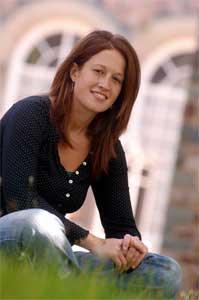 |
| Master's student Nikki Hoffman is studying spinal cord regeneration. (Abriel photo) |
Surprises come in all shapes and sizes. Nikki Hoffman├Ľs may have arrived in a small envelope, but inside was news that would change her life dramatically.
Ms. Hoffman was a star neuroscience undergrad. She was registered at King's where she had an exemplary involvement in sports, especially soccer. After graduating in 2005, she decided to take some time away from school to travel, visiting 23 countries throughout Africa, India and Southeast Asia.
Returning to Nova Scotia, Ms. Hoffman consulted with her undergraduate supervisor, Dr. Richard Brown of Dalhousie├Ľs psychology department. Although she was considering going to Africa on an internship program, she decided to take Dr. Brown├Ľs advice and apply for some Master├Ľs programs and for funding from the Natural Sciences and Engineering Council of Canada (NSERC).
Imagine her surprise when she received at letter from NSERC saying that she had received a Julie Payette Research Scholarship, worth $25,000 over one year.
'Nothing to lose'
├ĺIt took me a while to take it in,ÔÇŁ says Ms. Hoffman, who hadn├Ľt even heard of the award before she opened the letter. ├ĺI was just seeing what would happen (when I applied). It makes you realize that you should just apply for everything ├É you├Ľve got nothing to lose!ÔÇŁ
The Julie Payette Research Scholarships are offered to the best NSERC post-graduate master├Ľs scholarship candidates across the country. The awards are named after Julie Payette, Canadian astronaut and former NSERC Council member. Winners are selected for their outstanding academic excellence, research ability and potential, and leadership and communication skills. Ms. Hoffman is one of 24 recipients this year and one of only three from Atlantic Canadian universities.
What is Ms. Hoffman doing with the funding? This fall, she├Ľll be entering a master├Ľs program in neuroscience and physiology at Cambridge University. The Julie Payette Scholarships are different from traditional NSERC awards in that they can be used outside of Canada.
Cambridge bound
├ĺI wouldn├Ľt be going to Cambridge if it wasn├Ľt for the scholarship,ÔÇŁ she says, explaining that she couldn├Ľt pass down the opportunity to use this funding to study in England, where her family is originally from.
Although she did her undergraduate research thesis on a mouse model for Alzheimer├Ľs disease, she├Ľs shifting gears for her master├Ľs work to study spinal cord regeneration. ├ĺWhat we├Ľre going to look at is what happens beneath the lesion site and how regeneration occurs,ÔÇŁ she says, hoping to help develop new strategies for functional recovery after spinal cord injuries.
Beyond that, she├Ľs thinking about returning to Canada for her medical degree, with the hopes that her career might take her back to Africa or Asia: ├ĺPart of the reason that I want to get into medicine some day is so I can hopefully work in developing countries, try and help out as best I can.ÔÇŁ
